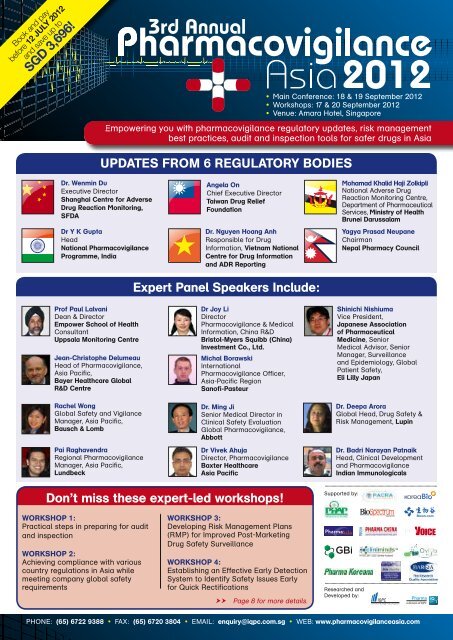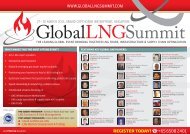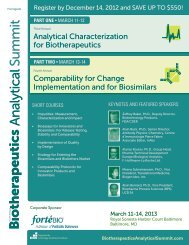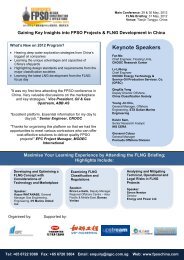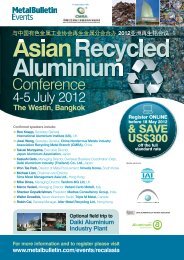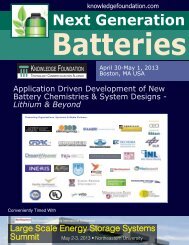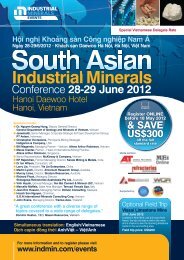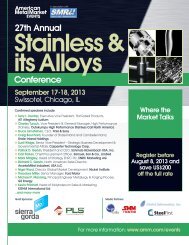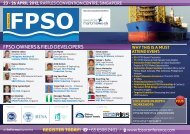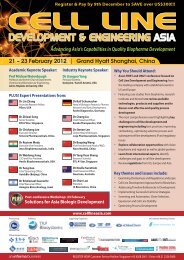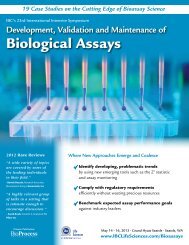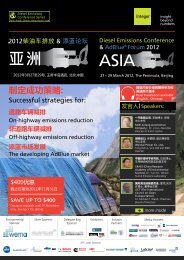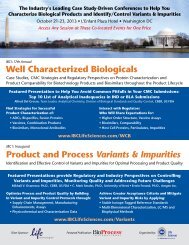ë¸ë¡ì (PDF)
ë¸ë¡ì (PDF)
ë¸ë¡ì (PDF)
Create successful ePaper yourself
Turn your PDF publications into a flip-book with our unique Google optimized e-Paper software.
Book and pay<br />
before 12 JULY 2012<br />
and save up to<br />
SGD 3,696!<br />
• Main Conference: 18 & 19 September 2012<br />
• Workshops: 17 & 20 September 2012<br />
• Venue: Amara Hotel, Singapore<br />
Empowering you with pharmacovigilance regulatory updates, risk management<br />
best practices, audit and inspection tools for safer drugs in Asia<br />
UPDATES FROM 6 REGULATORY BODIES<br />
Dr. Wenmin Du<br />
Executive Director<br />
Shanghai Centre for Adverse<br />
Drug Reaction Monitoring,<br />
SFDA<br />
Dr Y K Gupta<br />
Head<br />
National Pharmacovigilance<br />
Programme, India<br />
Angela On<br />
Chief Executive Director<br />
Taiwan Drug Relief<br />
Foundation<br />
Dr. Nguyen Hoang Anh<br />
Responsible for Drug<br />
Information, Vietnam National<br />
Centre for Drug Information<br />
and ADR Reporting<br />
Mohamad Khalid Haji Zolkipli<br />
National Adverse Drug<br />
Reaction Monitoring Centre,<br />
Department of Pharmaceutical<br />
Services, Ministry of Health<br />
Brunei Darussalam<br />
Yagya Prasad Neupane<br />
Chairman<br />
Nepal Pharmacy Council<br />
Expert Panel Speakers Include:<br />
Prof Paul Lalvani<br />
Dean & Director<br />
Empower School of Health<br />
Consultant<br />
Uppsala Monitoring Centre<br />
Jean-Christophe Delumeau<br />
Head of Pharmacovigilance,<br />
Asia Pacific,<br />
Bayer Healthcare Global<br />
R&D Centre<br />
Rachel Wong<br />
Global Safety and Vigilance<br />
Manager, Asia Pacific,<br />
Bausch & Lomb<br />
Pai Raghavendra<br />
Regional Pharmacovigilance<br />
Manager, Asia Pacific,<br />
Lundbeck<br />
Dr Joy Li<br />
Director<br />
Pharmacovigilance & Medical<br />
Information, China R&D<br />
Bristol-Myers Squibb (China)<br />
Investment Co., Ltd.<br />
Michal Borawski<br />
International<br />
Pharmacovigilance Officer,<br />
Asia-Pacific Region<br />
Sanofi-Pasteur<br />
Dr. Ming Ji<br />
Senior Medical Director in<br />
Clinical Safety Evaluation<br />
Global Pharmacovigilance,<br />
Abbott<br />
Dr Vivek Ahuja<br />
Director, Pharmacovigilance<br />
Baxter Healthcare<br />
Asia Pacific<br />
Shinichi Nishiuma<br />
Vice President,<br />
Japanese Association<br />
of Pharmaceutical<br />
Medicine, Senior<br />
Medical Advisor, Senior<br />
Manager, Surveillance<br />
and Epidemiology, Global<br />
Patient Safety,<br />
Eli Lilly Japan<br />
Dr. Deepa Arora<br />
Global Head, Drug Safety &<br />
Risk Management, Lupin<br />
Dr. Badri Narayan Patnaik<br />
Head, Clinical Development<br />
and Pharmacovigilance<br />
Indian Immunologicals<br />
Don’t miss these expert-led workshops!<br />
Supported by:<br />
WORKSHOP 1:<br />
Practical steps in preparing for audit<br />
and inspection<br />
WORKSHOP 2:<br />
Achieving compliance with various<br />
country regulations in Asia while<br />
meeting company global safety<br />
requirements<br />
WORKSHOP 3:<br />
Developing Risk Management Plans<br />
(RMP) for Improved Post-Marketing<br />
Drug Safety Surveillance<br />
WORKSHOP 4:<br />
Establishing an Effective Early Detection<br />
System to Identify Safety Issues Early<br />
for Quick Rectifications<br />
Page 8 for more details.<br />
Researched and<br />
Developed by:<br />
PHONE: (65) 6722 9388 • FAX: (65) 6720 3804 • EMAIL: enquiry@iqpc.com.sg • WEB: www.pharmacovigilanceasia.com
Dear Colleague,<br />
Asia presents the greatest growth opportunities in<br />
pharmaceutical industry. Increasing drug consumption, R&D<br />
activities and awareness of drug safety issues have led to a<br />
rise in drug safety and pharmacovigilance alerts in Asia.<br />
Asia has seen major product recalls in recent years, such<br />
as the recall of Augmentin in China in 2011. This has led<br />
to regulatory authorities across Asia to tighten regulations<br />
to safeguard the consumer health, and implement more<br />
comprehensive processes to ensure due diligence.<br />
These new requirements place significant pressure on<br />
pharmacovigilance professionals. In addition, the<br />
diverse and often ambiguous regulatory requirements across<br />
the region, and the relative infancy of pharmacovigilance of<br />
the region add to the challenge faced. Regulatory authorities<br />
and pharmacovigilance professionals need to stay up-to-date<br />
with regulatory updates, key PV strategies and processes to<br />
ensure drug safety.<br />
3rd Annual Pharmacovigilance Asia has established itself<br />
as the perfect platform connecting regulators and<br />
pharmacovigilance professionals. This event promises to<br />
gather Heads of Pharmacovigilance, Directors of Drug Safety,<br />
Medical Affairs Officers, Medical Safety Managers from<br />
regulatory authorities and leading pharmaceutical companies<br />
to brainstorm and share insights on:<br />
• Developing and implementing risk management and<br />
minimisation plans for improved drug safety<br />
• Preparing for audit and inspection:<br />
practical steps to get it right<br />
• Achieving compliance in various country regulations in Asia<br />
while meeting global safety requirements<br />
• Meeting the challenges of AE reporting for post-marketing<br />
surveillance studies<br />
• Establishing an early detection system for improved<br />
drug safety<br />
• Best practices in benefit-risk analysis to capture and<br />
characterise drug profiles<br />
Reserve your seat at the conference and the four workshops<br />
today. Equip yourself with knowledge and skills in<br />
pharmacovigilance strategic planning and daily operations.<br />
See you in Singapore this September!<br />
Yours sincerely,<br />
Yuyuan Chen<br />
Conference Producer<br />
Pharma IQ – A Division of IQPC Worldwide<br />
What makes this the<br />
must-attend event for the<br />
pharmaceutical industry<br />
• The ONLY event that focuses entirely on the<br />
pharmacovigilance landscape in Asia: your best<br />
opportunity to meet the region’s leading experts<br />
on PV to learn best industry practices on how they<br />
overcome their PV challenges<br />
• 1 full day dedicated for regulatory updates by<br />
Uppsala Monitoring Centre, European Commission,<br />
and regulatory authorities of China, India, Taiwan,<br />
South Korea, Vietnam and Brunei<br />
• 10 industry best practice case studies to empower<br />
you with proven successful tools: hear what your<br />
peers are doing to comply with regulatory<br />
requirements, improve risk management and prepare<br />
for audit and inspections<br />
• 4 workshops to maximise your opportunity out<br />
of office: learn insights on (1) preparing audits<br />
and inspection, (2) implementing risk management<br />
and minimization plans, (3) establishing effective<br />
early detection system and (4) achieving compliance<br />
with various country regulations in Asia<br />
• 1 regulator-led roundtable discussion: sit along with<br />
regulators and discuss the future of<br />
pharmacovigilance in various countries and how you<br />
can play a part in shaping this<br />
• Over 6 hours of networking opportunities plus a<br />
dedicated speed networking session for you to<br />
interact with regulators and senior pharmacovigilance<br />
professionals<br />
“The IQPC Pharmacovigilance<br />
conference in Singapore, which is<br />
becoming an annual event is, to my<br />
knowledge, the most comprehensive<br />
information exchange and discussion<br />
forum dedicated to pharmacovigilance<br />
held in Asia so far.”<br />
Head of Pharmacovigilance Asia-Pacific,<br />
Bayer Healthcare Global R&D Centre<br />
P.S. Take advantage of our early bird offer! Save up to<br />
SGD2,700 when you book and pay before 12 July 2012!<br />
Flip to the back page and register now!<br />
PHONE: (65) 6722 9388 • FAX: (65) 6720 3804 • EMAIL: enquiry@iqpc.com.sg • WEB: www.pharmacovigilanceasia.com
CONFERENCE DAY 1<br />
Tuesday, 18 September 2012<br />
08:30 Registration and Refreshments<br />
09:00 Opening Address and Welcome from the Chairman<br />
09:10 An Update from Uppsala Monitoring Centre (UMC):<br />
The Global WHO Pharmacovigilance Network<br />
As WHO’s collaborating centre for international<br />
drug monitoring, UMC is important in promoting<br />
pharmacovigilance. Its role includes screening and<br />
analysing international adverse reaction data,<br />
communicating up-to-date scientific information,<br />
and setting up and running national<br />
pharmacovigilance programmes. In this event, UMC<br />
will address:<br />
• In-depth understanding of WHO International<br />
Drug Monitoring Programme<br />
• Building a harmonised global pharmacovigilance<br />
network: benefits and challenges<br />
• Understanding the advantages of a single global<br />
database system for safety information and<br />
analysis<br />
• Highlighting efforts to be made in Asia to<br />
establish a harmonised PV network<br />
A senior representative from Uppsala Monitoring<br />
Centre will address this topic. Please refer to<br />
www.pharmacovigilanceasia.com for updates.<br />
09:45 Updates on Safety Database Development at<br />
National ADR Centre in China: Key Benefits and<br />
Implications for ADR Reporting<br />
Order #81 of MOH, China - “Provisions for Adverse<br />
Drug Reaction Reporting and Monitoring” - was<br />
announced on May 4, 2011 and was effective since<br />
July 1, 2011. This new PV regulation places<br />
obligations on the SFDA and regional monitoring<br />
centres. In this topic, Dr. Wu will address:<br />
• What the new PV regulation is all about<br />
• Insight into China’s central and local level ADR<br />
reporting systems<br />
• Examining the challenges in setting up safety<br />
database and how these were overcome<br />
• Case study: how National ADR Centre<br />
developed and implemented technology support<br />
systems<br />
• Understanding the implications for ADR reporting<br />
Dr. Du Wenmin<br />
Executive Director<br />
Shanghai Centre for ADR Monitoring, SFDA<br />
10:20 Speed Networking – Maximise your networking<br />
time efficiently! Meet regulators and<br />
pharmacovigilance officers in this session and get<br />
settled into comfortable and open discussions<br />
throughout the conference.<br />
10:40 Morning Refreshments and Networking Break<br />
11:00 Regulatory Updates for Pharmacovigilance<br />
in South Korea – Ensuring you comply with market<br />
requirements<br />
Under Pharmceutical Affairs Law amendment<br />
on June 7, 2011, Korean Drug Safety Management<br />
Centre and Committee of Review of Safety<br />
Information were founded. In addition, PV planning<br />
(REMS) was piloted since July 2011. This<br />
presentation will address:<br />
• Understanding the Pharmaceutical Affairs Act<br />
amendments in 2011: What it entails and the<br />
implications for pharmaceutical companies<br />
• Pharmacovigilance planning (REMS) draft<br />
guidance and enforcement step by step until<br />
mandatory in 2017: how you prepare for it<br />
• Complying with Korea’s clinical trials and postmarketing<br />
reporting requirements<br />
A senior representative from Korea FDA will<br />
address this topic. Please refer to<br />
www.pharmacovigilanceasia.com for updates.<br />
11:35 Surmounting the Challenges in Developing an<br />
Effective Pharmacovigilance Programme in India<br />
In December 2011, the Indian Council of Medical<br />
Research (ICMR) announced to lay down new<br />
guidelines to compensate volunteers for injuries<br />
during clinical research programmes. Meanwhile,<br />
under PV Programme of India (PvPI), additional 60<br />
ADR monitoring centres would be enrolled. This<br />
presentation will address:<br />
• The new ICMR guidelines’ impact on<br />
pharmaceutical industry – how to adjust<br />
to the new guidelines<br />
• Examining the major achievements of PvPI in the<br />
past year<br />
• Understanding the obstacles encountered when<br />
rolling out the PvPI programme and how these<br />
were overcome<br />
• Progress report – planning for next year’s<br />
activities: what you can look forward to<br />
• Lessons learned: how to build a nation-wide<br />
pharmacovigilance programme engaging all<br />
stakeholders<br />
Dr. Y K Gupta<br />
Coordinator, National Pharmacovigilance<br />
Programme, India, Professor and Head,<br />
Department of Pharmacology,<br />
All India Institute of Medical Sciences<br />
12:10 Lunch and Networking Break<br />
13:10 Updates from the European Commission:<br />
Implementing a New Pharmacovigilance System in<br />
Europe<br />
On 15 December 2010, the European Union<br />
enacted a new set of pharmacovigilance<br />
legislations that will take effect in July 2012. Under<br />
the new legislations, new PV system will be<br />
established to address new requirements on<br />
marketing authorisation holders, national<br />
competent authorities and the EMA, amongst<br />
others. This topic will address:<br />
• What is the new PV system all about<br />
• Strengthening and rationalising the existing<br />
safety monitoring system: what to be done<br />
PHONE: (65) 6722 9388 • FAX: (65) 6720 3804 • EMAIL: enquiry@iqpc.com.sg • WEB: www.pharmacovigilanceasia.com
CONFERENCE DAY 1<br />
Tuesday, 18 September 2012<br />
• How to implement measures for better<br />
prevention, detection and assessment of adverse<br />
reactions of medicine to improve patient safety<br />
and public health<br />
• Enabling patient direct reporting to the<br />
regulatory authorities: experiences and<br />
suggesitons<br />
• Broadening ADR reporting coverage to ensure<br />
better drug safety<br />
A senior representative from European<br />
Commission will address this topic. Please refer to<br />
www.pharmacovigilanceasia.com for updates.<br />
13:45 Pharmacovigilance Updates in Taiwan – Key<br />
implications for pharmaceutical companies<br />
Draft “Guidelines on RMP and Suggested Format<br />
and Content” was announced by Taiwan FDA in<br />
Jan 2011. In addition, Taiwan FDA announced<br />
in September 2011 that they would start PV<br />
inspections. Considering these changes, the<br />
speaker will address:<br />
• Assessing the latest development in RMP<br />
Guidelines, the applied scope and implications<br />
for pharmaceutical companies<br />
• Understanding the inspection requirements<br />
• New regulations on clinical trial reporting and<br />
the impact on pharmaceutical companies:<br />
how you prepare for the change<br />
• Complying with Taiwan’s reporting guidelines<br />
Angela On<br />
Chief Executive Director<br />
Taiwan Drug Relief Foundation<br />
14:20 Regulatory updates for Pharmacovigilance in<br />
Vietnam – Effectively operate in the Vietnamese<br />
market<br />
Vietnam MOH took a major step in<br />
pharmacovigilance when National Drug<br />
Information and Adverse Drug Reaction (DI&ADR)<br />
Center was estabished in 2009.<br />
PV framework was established with active<br />
surveillance as key element. This presentation will<br />
include:<br />
• Developing regulations for ADR reporting in<br />
Vietnam: The objectives and guidelines<br />
• Updates on post-marketing surveillance study<br />
requirements<br />
• Examining the current reporting guidelines and<br />
their implications for the pharmaceutical industry<br />
Dr. Nguyen Hoang Anh<br />
Responsible for Drug Information<br />
Vietnam National Centre for Drug Information and<br />
ADR Reporting<br />
14:55 Afternoon Tea and Networking Break<br />
15:25 New guidelines on ADR reporting in Brunei –<br />
How will it impact you<br />
• Introducing the new guidelines and important<br />
updates on ADR reporting requirements in Brunei<br />
• Contributions of the guidelines to the ASEAN<br />
harmonization programme<br />
• Brunei’s experience in having industry comply<br />
with the new ADR reporting: how successful is it<br />
• Exploring strategies to further improve ADR<br />
reporting to ensure drug safety<br />
Mohamad Khalid Haji Zolkipli<br />
National Adverse Drug Reaction Monitoring Centre,<br />
Department of Pharmaceutical Services<br />
Ministry of Health Brunei Darussalam<br />
16:00 Status of Pharmacovigilance in Nepal<br />
• Insightful understanding of current<br />
pharmacovigilance situation in Nepal<br />
• Late update on national drug policy<br />
• Evaluating the market study in delivering safe<br />
medicine by local manufacturers<br />
• Examining the role of Nepal Pharmacy Council<br />
in controlling the quality of pharmacy manpower<br />
who are licentiated with the council.<br />
• Pharmacovigillance network in Nepal and scope<br />
Yagya Prasad Neupane<br />
Chairman<br />
Nepal Pharmacy Council<br />
16:35 Regulator-led Roundtable Discussion<br />
In this session, participants can choose to participate<br />
in one of the regulator-led groups focused on<br />
pharmacovigilance best practices and updates in 5<br />
different regions, namely: Greater China, Southeast<br />
Asia, India, Northeast Asia and EU & US. You will have<br />
the chance to go up-close and personal with<br />
regulators and experts in the specific region to<br />
discuss PV issues and have your queries clarified.<br />
Prepare your questions before the session to have a<br />
fruitful discussion.<br />
Key discussion points include:<br />
• Are there PV reporting guidelines and fields to be<br />
clarified<br />
• Where are the FDA agencies heading to<br />
• What are the likely revision areas and how do<br />
they impact the pharmaceutical industry<br />
• How pharmaceutical industry can play its role<br />
to help establish ADR database and in postmarketing<br />
surveillance programme<br />
17:10 Chairman’s Closing Remarks<br />
17:15 Close of Conference Day One<br />
“Had an overall understanding of pharmacovigilance<br />
running in Asia, particularly in ASEAN. It is helpful<br />
for me to make a plan locally and accelerate<br />
pharmacovigilance strategy locally.”<br />
Director of Regulatory Affairs, Nycomed China<br />
PHONE: (65) 6722 9388 • FAX: (65) 6720 3804 • EMAIL: enquiry@iqpc.com.sg • WEB: www.pharmacovigilanceasia.com
CONFERENCE DAY 2<br />
Wednesday, 19 September 2012<br />
08:30 Registration and Refreshments<br />
08:50 Opening Address and Welcome from the Chairman<br />
09:00 Pharmacovigilance Challenges in Developing Asian<br />
Countries: the Landscape and Potential Solutions<br />
• Overview of the pharmacovigilance state in<br />
developing Asian countries<br />
• Pinpointing the challenges faced in developing<br />
Asian countries: what they are and what<br />
implications they have for drug safety and<br />
pharmaceutical companies<br />
• Evaluating solutions to overcome these<br />
challenges<br />
• Case studies: what can we learn from successful<br />
experiences in Asia<br />
Prof Paul Lalvani<br />
Dean & Director, Empower School of Health<br />
Consultant, Uppsala Monitoring Centre<br />
09:35 Case Study: Preparing for Audit and Inspection:<br />
Practical Steps to Get it Right<br />
• Reviewing how pharmacovigilance audit and<br />
inspection practices evolved globally and unique<br />
challenges in Asia<br />
• Planning targeted and routine inspections at<br />
regional level<br />
• Exploring practical steps to train local<br />
pharmacovigilance staff to meet country-specific<br />
inspection and audit requirements as well as<br />
global standards<br />
Pai Raghavendra<br />
Regional Pharmacovigilance<br />
Manager, Asia Pacific<br />
Lundbeck<br />
10:10 Morning Refreshment and Networking Break<br />
10:40 Pharmacovigilance Challenges in Newer Vaccines:<br />
Present and the Evolving Future<br />
• Reviewing global vaccinovigilance methodologies<br />
• Understanding the road blocks in vaccine related<br />
causality assessment.<br />
• Assessing next generation vaccines and safety<br />
monitoring challenges.<br />
• Case Studies<br />
• Evaluating the importance of data mining for<br />
signal generation.<br />
Dr. Badri Narayan Patnaik<br />
Head, Clinical Development and<br />
Pharmacovigilance Indian Immunologicals<br />
11:15 Impact of the new EU Pharmacovigilance<br />
Standards on the Safety Regulatory Environment<br />
in Asia<br />
• Understand in detail the new EU<br />
pharmacovigilance standards<br />
• Examine the impact on drug safety regulatory<br />
environment in Asia: will Asia follow suit soon<br />
• Evaluate how regulatory authority may shape<br />
guidelines to maintain country specific<br />
requirements<br />
• How pharmaceutical companies should prepare<br />
for the change<br />
Jean-Christophe Delumeau<br />
Head of Pharmacovigilance, Asia Pacific<br />
Bayer Healthcare Global R&D Centre<br />
11:50 Case Study: Best Practices and Future Challenges<br />
in Japan on Post-Marketing Surveillance –<br />
Observational Study and EPPV Programme<br />
• Examining the post-marketing surveillance<br />
systems in Japan<br />
• Case study: The Early Phase Post-Marketing<br />
Vigilance (EPPV) programme in Japan<br />
• How to evaluate the unique regulatory<br />
requirements in your country The backdrop for<br />
signal detection and risk management<br />
• Exploring approaches to shape EPPV to comply<br />
with local regulatory requirements<br />
Shinichi Nishiuma<br />
Vice President, Japanese Association of<br />
Pharmaceutical Medicine, Senior Medical<br />
Advisor, Senior Manager, Surveillance and<br />
Epidemiology, Global Patient Safety,<br />
Eli Lilly Japan<br />
12:25 Lunch and Networking Break<br />
13:25 Case Study: Best Practices in Benefit Risk<br />
Analysis to Capture and Characterise a Drug<br />
Profile<br />
• Understanding the regulatory reporting<br />
requirements for marketed biopharmaceutical<br />
products<br />
• Implementing Multi-Criteria Decision Analysis<br />
(MCDA) for quantitative modelling of a drug’s<br />
benefit-risk profile: how to do this<br />
• Evaluating the challenges in characterising a<br />
drug’s benefit-risk profile<br />
• Exploring best practices in benefit risk analysis<br />
to capture and characterise a drug profile<br />
Deepa Arora<br />
Global Head, Drug Safety & Risk<br />
Management<br />
Lupin<br />
14:00 Case Study: Achieving Compliance with Various<br />
Country Regulations in Asia While Meeting Global<br />
Safety Requirements<br />
• Reviewing the challenges of complying with<br />
changing country regulations in Asia<br />
• Examining approaches in setting up a Local Drug<br />
Safety Office (LDSO), Asia<br />
PHONE: (65) 6722 9388 • FAX: (65) 6720 3804 • EMAIL: enquiry@iqpc.com.sg • WEB: www.pharmacovigilanceasia.com
CONFERENCE DAY 2<br />
Wednesday, 19 September 2012<br />
• Incorporating various regulatory requirements<br />
into SOPs: what were the challenges<br />
• Ensuring the pharmacovigilance practices are<br />
compliant with global safety requirement: how to<br />
do this successfully<br />
Michal Borawski<br />
International Pharmacovigilance Officer,<br />
Asia-Pacific Region<br />
Sanofi-Pasteur<br />
14:35 Developing and Implementing Pro-Active<br />
Pharmacovigilance (PV) Strategies to Ensure Drug<br />
Safety<br />
• Understanding in-depth the essential<br />
components of pharmcovigilance (PV)<br />
• Developing and implementing pro-active PV<br />
strategies to ensure drug safety: how to manage<br />
PV system, safety planning and risk management<br />
and mitigation at a high level<br />
• Turning the strategies into detailed practical<br />
steps<br />
• Exploring how to capitalise on the pro-active PV<br />
strategies for better drug safety<br />
Dr. Ming Ji<br />
Senior Medical Director in Clinical Safety<br />
Evaluation Global Pharmacovigilance<br />
Abbott<br />
15:10 Afternoon Tea and Refreshement Break<br />
15:40 Case Study: The Impact of Ex-Asia<br />
Pharmacovigilance Regulations in Bausch + Lomb<br />
Asia-Pacific<br />
• An overview of the new European Commission<br />
Pharmacovigilance Legislation and other<br />
regulations – the impact on the safety monitoring<br />
of globally registered products within Asia-Pacific<br />
• Understanding communication requirements for<br />
active substances’ worldwide exposure<br />
• Exploring other impacts of Ex-Asia<br />
Pharmacovigilance Regulations on the safety<br />
monitoring systems in Asia-Pacific<br />
• Assessing the strategies to meet ex-Asia<br />
Pharmacovigilance Regulations in Asia-Pacific<br />
Rachel Wong<br />
Global Safety and Vigilance Manager,<br />
Asia Pacific<br />
Bausch & Lomb<br />
16:15 Case Study: Protecting Pharmaceutical<br />
Companies in China from Legal Challenges<br />
Pertaining to Drug Safety<br />
• Understanding Chinese regulatory requirements:<br />
your rights and obligations<br />
• Update on current practices of processing legal<br />
suits and compensation claims in China<br />
• Case study: sharings on how you prepare and<br />
protect your companies from legal challenges<br />
pertaining to drug safety<br />
Dr Joy Li<br />
Director<br />
Pharmacovigilance & Medical Information,<br />
China R&D<br />
Bristol-Myers Squibb (China) Investment<br />
Co., Ltd.<br />
16:50 Chairman’s Closing Remarks<br />
16:55 Close of Conference Day Two<br />
“This conference offers the opportunity<br />
for those working in pharmacovigilance<br />
to share expertise and learn about best<br />
practices and challenge the way they<br />
do things.”<br />
Pharmacovigilance Manager, MSD<br />
PHONE: (65) 6722 9388 • FAX: (65) 6720 3804 • EMAIL: enquiry@iqpc.com.sg • WEB: www.pharmacovigilanceasia.com
WORKSHOPS<br />
Monday, 17 September, 2012<br />
WORKSHOP A<br />
0900 – 1200: Monday, 17 September 2012<br />
(inclusive of 30-min refreshment and networking break)<br />
Practical steps in preparing<br />
for PV inspection<br />
To ensure regulatory compliance, inspections are conducted<br />
regularly which require much and careful preparation work.<br />
Different stakeholders will be involved as well which adds<br />
to the complexity. It is critical for the team to be properly<br />
prepared and make sure every step is right to lead to a<br />
fruitful inspection.<br />
Dr. Ming Ji will share through his vast experience in this<br />
field the common challenges, and give insights on practical<br />
steps to prepare for PV inspection.<br />
WORKSHOP AGENDA<br />
0830 Registration<br />
0900 Welcome from Workshop Leader<br />
0905 Understanding PV inspections<br />
• purposes<br />
• inspection documents<br />
• key requirements<br />
• reporting timeline<br />
0930 What to prepare<br />
• before<br />
• through and<br />
• after an inspection<br />
1000 Preparing documents<br />
• what are they<br />
• which sections require special attention<br />
• acquiring information from departments<br />
1030 Refreshment and Networking Break<br />
1100 Developing good communications strategies<br />
• why communications are important<br />
• common challenges and impact on inspection<br />
results<br />
• what works best<br />
1130 Conducting a mock inspection<br />
1200 End of workshop<br />
About your workshop leader:<br />
Dr. Ming Ji, MD, MS.<br />
Senior Medical Director, Global Pharmacovigilance<br />
Abbott<br />
Dr. Ming Ji had extensive experience in clinical drug<br />
safety, pharmacovigilance and clinical pharmacology.<br />
Prior to his current post, Dr. Ji served as medical director<br />
at Pharmacovigilance Department of TAP Pharmaceutical<br />
Inc., executive director at Global Safety of Amgen Inc., and<br />
medical monitor in Clinical Development of Wyeth.<br />
WORKSHOP B<br />
1400 – 1700: Monday, 17 September 2012<br />
(inclusive of 30-min refreshment and networking break)<br />
Achieving compliance with various<br />
country regulations in Asia while<br />
meeting company global safety<br />
requirements<br />
As Asia presents the largest growth opportunity for<br />
pharmaceutical industry, many are taking foothold in<br />
Asia to gain market share. One major challenge faced is<br />
to ensure compliance with various country regulations,<br />
which are rapidly changing and evolving. In addition, the<br />
company’s global safety requirements add to the burden of<br />
pharmacovigilance professionals.<br />
In this workshop, you will learn how to effectively comply<br />
with various country regulations in Asia while meeting<br />
company’s global safety requirements.<br />
WORKSHOP AGENDA<br />
1330 Registration<br />
1400 Welcome from Workshop Leader<br />
1405 Understanding PV regulations in Asia<br />
• What are PV regulatory requirements in Asian<br />
countries<br />
• How PV regulations differ in various countries<br />
• Implications for PV managers<br />
1430 Achieving compliance in Asia<br />
• what areas to look out for<br />
• ensuring due diligence<br />
• conducting mock inspections internally<br />
1500 Making compliance simple<br />
• SOPs to incorporate regulatory requirements<br />
• company global safety requirements<br />
1530 Refreshment and Networking Break<br />
1600 Case study of Sanofi-Pasteur<br />
• what it does to comply with Asian regulations and<br />
company global safety requirements<br />
• common challenges and impact on PV compliance<br />
• strategies to overcome the challenges<br />
1630 Hands-on application<br />
• how your PV practices can be improved<br />
• will Sanofi-Pasteur’s way work for you<br />
• Modifying your PV practices to make compliance<br />
reliable and simple<br />
1700 End of workshop<br />
This workshop will be led by an industry expert. Look out for<br />
our workshop leader announcement at<br />
www.pharmacovigilanceasia.com.<br />
PHONE: (65) 6722 9388 • FAX: (65) 6720 3804 • EMAIL: enquiry@iqpc.com.sg • WEB: www.pharmacovigilanceasia.com
WORKSHOPS<br />
Thursday, 20 September, 2012<br />
WORKSHOP C<br />
0900 – 1200: Thursday, 20 September 2012<br />
(inclusive of 30-min refreshment and networking break)<br />
Developing Risk Management Plans<br />
(RMP) for Improved Post-Marketing<br />
Drug Safety Surveillance<br />
Risk management planning (RMP) has been developped in<br />
EU and US for improved post-marketing drug surveillance.<br />
In EU, it is mandatory for companies to submit a RMP at the<br />
time of application for a Marketing Authorization for most<br />
products.<br />
With fast evolving regulations in Asia to address drug safety,<br />
RMP will soon be adopted and implemented. In fact, Korea<br />
annouced draft REMS (similar to RMP) in August 2011, to<br />
be mandatory in 201 7, and Taiwan announced RMP draft in<br />
2011 and started PV inspections in September 2011.<br />
This workshop will equip you with knowledge on specific<br />
elements of a RMP, the detailed template and guidelines,<br />
and how you can develop RMP to improve your postmarketing<br />
drug safety surveillance.<br />
WORKSHOP AGENDA<br />
0830 Registration<br />
0900 Welcome from Workshop Leader<br />
0905 Understanding RMP<br />
• purposes<br />
• when to submit a RMP<br />
• what are the key elements<br />
0930 Element 1: safety specification<br />
• defining identified and potential risks<br />
• limitations of clinical research program<br />
• missing information of drug safety<br />
1000 Element 2: pharmacovigilance plan<br />
• what is the scope<br />
• what plan details are required<br />
• resolving the uncertainties in drug safety<br />
1030 Refreshment and Networking Break<br />
1100 Element 3: risk minimization plan<br />
• the plan’s scope and purposes<br />
• measures to reduce severity or frequency of<br />
known ADRs<br />
1130 Hands-on exercise to develop a RMP for your<br />
company<br />
1200 End of workshop<br />
This workshop will be led by an industry expert on RMP.<br />
Look out for our workshop leader announcement at<br />
www.pharmacovigilanceasia.com.<br />
WORKSHOP D<br />
1400 – 1700: Thursday, 20 September 2012<br />
(inclusive of 30-min refreshment and networking break)<br />
Establishing an Effective Early<br />
Detection System to Identify Safety<br />
Issues Early for Quick Rectifications<br />
Rare but serious adverse events associated with drugs<br />
are often nearly impossible to detect in pre-licensure<br />
studies and require monitoring after introduction to market.<br />
Pharmaceutical companies thus look to buidling an<br />
effective early detection system to identify safety issues<br />
early for quick rectifications.<br />
This workshop will equip you with knowledge and strategies to:<br />
• aggregate and integrate drug safety data from<br />
various sources<br />
• uncover hidden insights in unstructured sources<br />
• mitigate potential post-marketing risks<br />
• drive better drug development decisions<br />
WORKSHOP AGENDA<br />
1330 Registration<br />
1400 Welcome from Workshop Leader<br />
1405 Understanding early detection system<br />
• the purposes<br />
• significance of early detection system for<br />
drug safety<br />
• common methodologies and analytical methods<br />
1430 Data input<br />
• various sources of data<br />
• transform, cleanse and standardise data<br />
• aggregate and integrate drug safety data<br />
1500 Uncovering hidden insights<br />
• unstructured texts and their importance to drug<br />
safety<br />
• text mining and proactive scanning for safety<br />
signals<br />
1530 Refreshment and Networking Break<br />
1600 Improving drug development decisions<br />
• methodologies in early detection system<br />
• strengths and limitations of analytical methods<br />
• applying early detection system throughout a<br />
drug’s life cycle<br />
• case study<br />
1630 Hands-on application<br />
• limitations in your early detection system<br />
• how your early detection system can be<br />
improved<br />
1700 End of workshop<br />
This workshop will be led by an industry expert on<br />
establising early detection systems. Look out for our<br />
workshop leader announcement at<br />
www.pharmacovigilanceasia.com.<br />
PHONE: (65) 6722 9388 • FAX: (65) 6720 3804 • EMAIL: enquiry@iqpc.com.sg • WEB: www.pharmacovigilanceasia.com
Take advantage of the exclusive<br />
sponsorship opportunities this<br />
event offers<br />
As pharmceutical companies are rapidly building up expertise<br />
in pharmacovigilance in Asia, they are actively seeking<br />
solutions and consultancy offers in the areas of:<br />
• Risk management and mitigation<br />
• Auditing and inspection preparation<br />
• Pharmacovigilance consultancy<br />
• Data mining, signal detection, ADR reporting,<br />
drug safety analysis<br />
• Legal advice<br />
This truly regional event only brings together your principal<br />
clients, but also allows you to interact with them one-to-one.<br />
Take advantage of this opportunity to enjoy sponsor benefits:<br />
1. Achieve thought leadership by speaking and exhibiting in<br />
this event: showcase your expertise, superior products and<br />
services, and impress your prospects<br />
2. Maximise your exposure by leveraging on our<br />
marketing resources, including print advertisements, online<br />
advertisements, website, email campaigns to over 10,000<br />
pharmacovigilance personnel in Asia<br />
3. Optimise your influence: chair the event and shape the<br />
event flow – it is your opportunity to influence the<br />
audience and position your organisation as industry leader<br />
4. Position yourself a step forward from other vendors by<br />
hosting networking lunch – let it be your corporate lunch!<br />
Discuss business in an informal way<br />
5. Tailored business development arrangements: targeted<br />
prospect invitation and pre-arranged meetings to ensure<br />
you are meeting the right people and developing the<br />
business relationship you desire<br />
Sponsorship opportunities are deliberately limited. Contact us<br />
today to explore how we can best leverage this platform to<br />
customerise a package that achieves your business objectives:<br />
Call +65 6722 9388 or email sponsorship@iqpc.com.sg.<br />
“Good forum to discuss Asia Pacific<br />
regulations. Good networking opportunities<br />
to set up a pharmacovigilance working<br />
group in this region!”<br />
Balasubramanian Sankaranarayanan,<br />
Head of UFESCIENCES EU&APAC, Cognizant<br />
PHONE: (65) 6722 9388 • FAX: (65) 6720 3804 • EMAIL: enquiry@iqpc.com.sg • WEB: www.pharmacovigilanceasia.com


